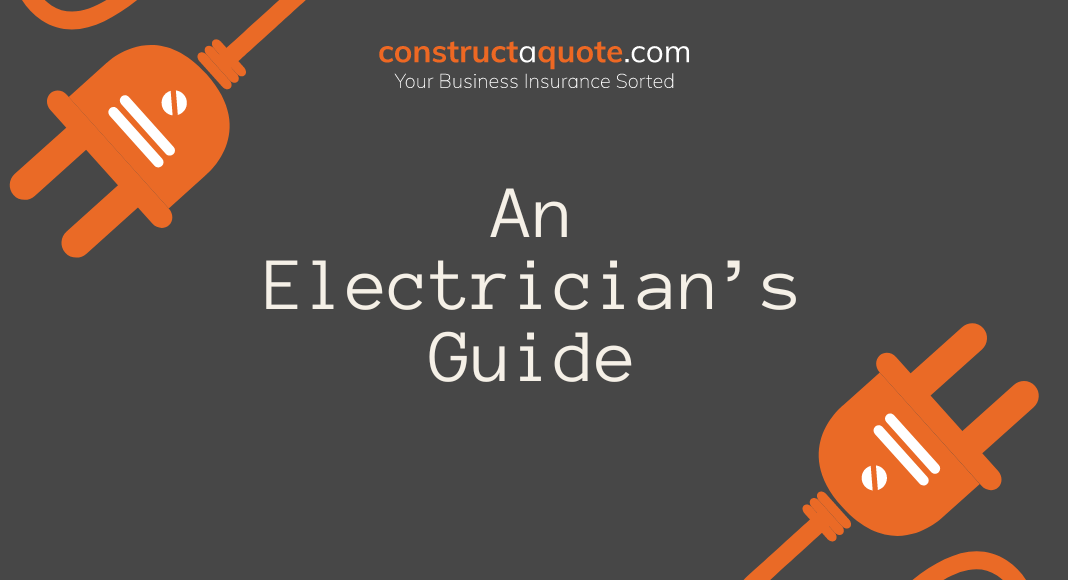by constructaquote - 1 September 2020


There are hazards around every corner for those working as an Electrician. Exposed sockets and live wires are a risk not only to yourself and your customers, but also members of the public who may be present whilst you work. If someone was to be injured or their property was damaged as a result of your work, and you’re not insured, the consequences could be catastrophic for your business. This guide provides an overview of the insurance products you should consider if you are working as an Electrician.
Public Liability Insurance protects you against the cost of claims made by members of the public if they become injured or their property is damaged as a direct result of your work. There are a whole number of scenarios that could lead to a customer, or member of the public, making a claim against you – you could drop a tool and damage a customer’s car whilst fitting an external intruder light or someone could be electrocuted from a faulty switch you’ve fitted. If this was to happen and a claim was made against you, the costs could put you out of business. So whilst it is not a legal requirement to have PL insurance, given the risk of your trade it is highly recommended.
In addition to the duty of care you owe your employees, you are legally required to have Employers’ Liability if you have more than one employee or hire labour only subcontractors. Consider that a member of your team could seriously injure themselves by falling from a ladder or electrocuting themselves. Employers’ Liability Insurance would protect you against the costs of a compensation claims that could be made against your business from your injured employee. You are legally required to have a minimum insurance cover of £5 million. However, given the risk involved in your trade you may find your business needs more cover and constructaquote.com can offer cover up to £10 million.
If your work consists solely of design and install contracts, where the designs and specifications are included in the overall job, Public Liability Insurance may be adequate cover for you. However, if you produce designs and specifications as part of the quote process, or on a standalone basis, you should seriously consider the value of Professional Indemnity Insurance. Take this as an example; you give advice on the design and installation of a new lighting system for a hotel, and this design is later used but is faulty – you could still be liable even if you didn’t carry out the work yourself. Whilst PI insurance is not a legal requirement, you should consider the implications of facing a claim without insurance.
It’s simple really – if you have a van to drive you from A to B you’ve got to insure it. Even if your van is parked and kept off road, unless you have obtained an official statutory off road notification confirming you’re not going to use it, you need insurance. The type of cover you choose depends on how you use your van and your personal requirements. From third party, which only covers third parties, to full comprehensive cover which can help cover your vehicle in different ways. When you consider that without your van you wouldn’t be able to transport your tools or travel between jobs, it’s pretty important that you’ve ticked off Van insurance before you start booking in work.
Let’s be honest any trade is going to struggle without their tools, but try rewiring a socket with your bare hands! So ask yourself, if your tools were lost, damaged or stolen, do you have a backup set or the money to replace them? As with Van insurance, you can decide the level of tools insurance cover you require based on the type of business you are and the kind of tools you want to be covered. At the end of the day, without your tools you are not going to work so it is important to protect your investment and your livelihood.
There are additional policies that may also benefit you depending on the type of work you carry out. Hired in Plant and Machinery Insurance may be applicable if you are working on larger projects which will require you to hire in plant. Alternatively, Own Plant Machinery Insurance could be needed if you regularly work on larger projects and have your own plant. You can also consider a Commercial Legal and Tax Policy – which covers legal, tax advice and cover for employment, contract and debt recovery disputes – and an Excess Waiver policy which will cover your excess after a successful settlement of a claim.
Ultimately, the products you need are effected by a whole number of factors. It helps to speak to a trained Insurance Executive who can fully explain each product and help you make an informed decision based on your requirements. At constructaquote.com we have 30 years’ experience in helping customers get their insurance sorted. For a great service and a competitive quote for your Electricians’ Insurance, speak to our team today on 08081 68 68 68 or start the online quote process now.

by Charlotte Houghton - 7 October 2020
by constructaquote - 6 October 2020
by Charlotte Houghton - 29 September 2020
by Charlotte Houghton - 24 September 2020